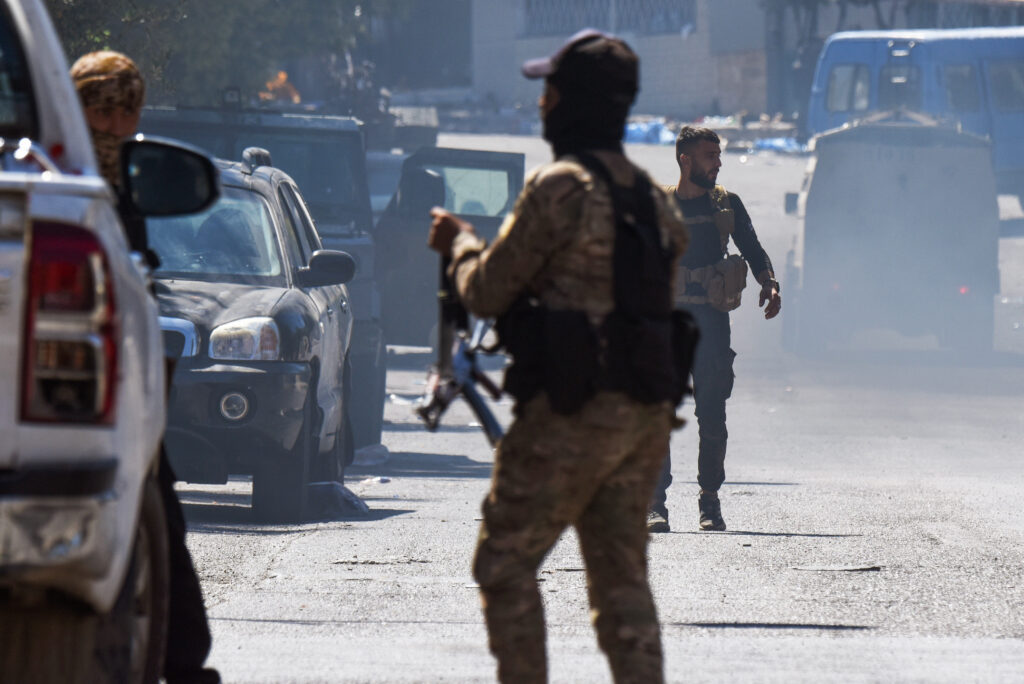In Syria’s Druze-majority city of Sweida, residents said they have been living in terror since the arrival of government forces who have been carrying out what witnesses and a war monitor have called summary executions.”A lot of my friends were killed, including a doctor who was going to hospital,” said Osama, 32, by telephone on Wednesday, adding he was in the centre of the southern city.”There were summary executions in the streets,” he told AFP crying, declining to provide his surname.”If they reach here, I’m dead,” he said, adding: “I fear massacres similar to those on the coast.”In early March, hundreds of civilians mostly from Syria’s Alawite minority were massacred in the community’s coastal heartland after attacks on the security forces. Security personnel, allied armed groups and foreign jihadists were accused of committing the atrocities.Paramedic Munzer, 43, said he was stuck at home in Sweida unable to respond to calls for help.”Entire families have been decimated. I know a family of four who were killed in their home,” he said.”The bombardment didn’t stop all night,” said Munzer, also declining to provide his surname.”We have nothing left to eat in the fridge, just some dry biscuits, and some fruit and vegetables that have gone bad because the power has been cut off for 48 hours,” he said.”I have four children but I don’t know how to protect them.”- ‘Catastrophic situation’ -But the hardest thing, according to Munzer, is being unable to do his job as a paramedic.He said he had received more than 50 calls for help and was worried about the “catastrophic situation” in the city’s main hospital where he usually works.An AFP correspondent in the city saw men wearing defence ministry uniforms, some with their faces covered, launching mortars and crying out “Allahu akbar” (God is greatest, in Arabic) near the bodies of two Druze fighters, as other combatants went house to house carrying out searches.The city of some 150,000 residents was deserted and shops were closed.Another AFP correspondent saw on Wednesday some 30 bodies on the ground, including government forces and fighters in civilian clothes whose affiliation was not immediately clear.According to the Syrian Observatory for Human Rights monitor, more than 300 people have been killed since fighting erupted on Sunday between Druze fighters and Bedouin tribes, sparking government intervention, and Israeli strikes in support of the Druze.Most of the dead are fighters but they also include 40 civilians, 27 of them summarily executed by security force personnel, according to the Britain-based Observatory, which relies on a network of sources inside Syria.The Syrian presidency on Wednesday condemned “heinous acts” and vowed to punish those responsible.A committee tasked to investigate the coastal massacres in March was supposed to issue its findings earlier this month but no report has been announced.
In Syria’s Druze-majority city of Sweida, residents said they have been living in terror since the arrival of government forces who have been carrying out what witnesses and a war monitor have called summary executions.”A lot of my friends were killed, including a doctor who was going to hospital,” said Osama, 32, by telephone on Wednesday, adding he was in the centre of the southern city.”There were summary executions in the streets,” he told AFP crying, declining to provide his surname.”If they reach here, I’m dead,” he said, adding: “I fear massacres similar to those on the coast.”In early March, hundreds of civilians mostly from Syria’s Alawite minority were massacred in the community’s coastal heartland after attacks on the security forces. Security personnel, allied armed groups and foreign jihadists were accused of committing the atrocities.Paramedic Munzer, 43, said he was stuck at home in Sweida unable to respond to calls for help.”Entire families have been decimated. I know a family of four who were killed in their home,” he said.”The bombardment didn’t stop all night,” said Munzer, also declining to provide his surname.”We have nothing left to eat in the fridge, just some dry biscuits, and some fruit and vegetables that have gone bad because the power has been cut off for 48 hours,” he said.”I have four children but I don’t know how to protect them.”- ‘Catastrophic situation’ -But the hardest thing, according to Munzer, is being unable to do his job as a paramedic.He said he had received more than 50 calls for help and was worried about the “catastrophic situation” in the city’s main hospital where he usually works.An AFP correspondent in the city saw men wearing defence ministry uniforms, some with their faces covered, launching mortars and crying out “Allahu akbar” (God is greatest, in Arabic) near the bodies of two Druze fighters, as other combatants went house to house carrying out searches.The city of some 150,000 residents was deserted and shops were closed.Another AFP correspondent saw on Wednesday some 30 bodies on the ground, including government forces and fighters in civilian clothes whose affiliation was not immediately clear.According to the Syrian Observatory for Human Rights monitor, more than 300 people have been killed since fighting erupted on Sunday between Druze fighters and Bedouin tribes, sparking government intervention, and Israeli strikes in support of the Druze.Most of the dead are fighters but they also include 40 civilians, 27 of them summarily executed by security force personnel, according to the Britain-based Observatory, which relies on a network of sources inside Syria.The Syrian presidency on Wednesday condemned “heinous acts” and vowed to punish those responsible.A committee tasked to investigate the coastal massacres in March was supposed to issue its findings earlier this month but no report has been announced.
